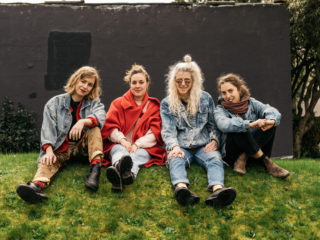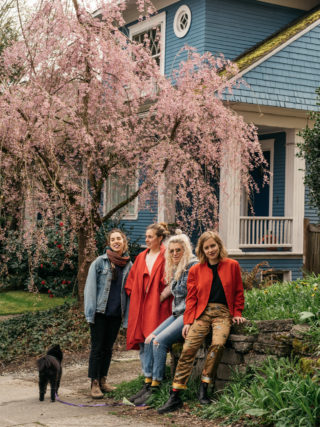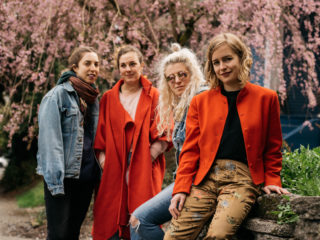No one nails that feeling of being drunk at 5am and searching for the meaning of life like Chastity Belt
Seattle’s hard-partying band are growing up, but not too much

Seattle’s hard-partying band are growing up, but not too much
Chatting to Julia Shapiro is like catching up with an old friend. She greets me enthusiastically as we bemoan the 8-hour time difference between us, and how near impossible it was to set this interview up because of it. When I ask how she’s doing, she’s understandably excited about the release of Chastity Belt’s new album, ‘I Used To Spend So Much Time Alone’. “I just listened to our test pressing of the record, it sounds good!” she says.
She’s not wrong: Chastity Belt’s third full length captures the band at their best, with a sound that’s more realised than previous efforts. While 2013’s ‘No Regrets’ honed in on a propensity for melody and a penchant for partying, its follow-up (‘Time To Go Home’) seemed like a darker, more cynical counterpart. ‘I Used To Spend Time Alone’ blends the best of both worlds, and Shapiro agrees that it’s what they’ve been aiming for all along: “I think it’s a bit darker, we’ve all gotten better at writing songs and so with that I think it’s easier to write stuff that we actually want to be writing”, she explains.
One thing I’ve always found most appealing about Chastity Belt’s music is that they are innately great at combining light pop melodies with heavy subject matters – a theme which is retained on ‘I Used To Spend So Much Time Alone’. I ask Julia if the contrast between light and dark is something that particularly appeals to her. “Yeah,” she says. “I’d say that’s what interests me in most things, beyond music even. I’m interested in how happy and melancholy can interact. My favourite songs have both a happy/nostalgic feel to them with something darker going on underneath. I get that feeling from a lot of Elliot Smith and Beach Boys songs.”

We both find a kinship in our love for happy melancholy. I recommend a song to her – ‘You Should All Be Murdered’ by Another Sunny Day, which I’m confident she’ll like because of its similarity to The Smiths’ brand of jolly cynicism. For context, Jonny Marr once complimented the band on their guitar sound, and revealed himself as a fan. Fittingly, there are tinges of Morrissey’s tongue-in-cheek lyricism in Shapiro’s words, too, and they’re refreshingly devoid of cliché unless it’s knowing or intentional. I get the impression that she is meticulous – cautious, even – when it comes to writing lyrics. “I’m pretty picky when it comes to writing lyrics,” she agrees. “A lot of things make me cringe. I try really hard not to write anything too cheesy, because I’m going to have to live with singing the lyrics night after night when we’re on tour. I have to try extra hard not to write cheesy lyrics when a song already sounds kind of emo already.”
I talk to Julia about a couple of my favourite songs on the new album, one of which being a track called ‘Complain’, about looking at things pessimistically. I ask her to elaborate. “Yeah, ‘Complain’ is sort of about me being a negative Nancy. Not that I’m like that all the time – I still go out and have fun – but it’s about being angry and not being able to have fun and wanting to complain about it,” she laughs.
“I get in moods like that especially when it’s been raining nonstop for three months straight, maybe that’s it. You guys get a lot of rain there, too, right?”
Shapiro explains that the rise of ‘tech bro’ phenomenon is partly to blame for nights out not being so fun anymore, with it being particularly pervasive in Seattle where the band reside. Unfamiliar with the term, I ask her to explain what ‘tech bro’ meant, and she replies with baffled resentment: “Do you not have tech bros in the UK? You are so lucky! They are computer programmers who move here to work at Amazon or Microsoft without any sense of the culture of the city. They live in nice condos that were recently built to accommodate how many people are moving to Seattle for tech stuff. It’s happening everywhere, but it’s especially extreme in places like Seattle and San Francisco. Some of them are really oblivious and obnoxious and a lot of them don’t tip very well.”
Despite this, Chastity Belt are still heavy party-goers. Their first album in particular focused primarily on getting wasted and having fun. But while the likes of, say, Best Coast depicted partying with near child-like simplicity, Chastity Belt have a tendency to make the subject sound almost profound, yet playful. Shapiro’s lyrics are smart, literate and completely devoid of the usual platitudes that many of their contemporaries are guilty of using.
There’s a song that reminded me of myself on ‘I Spend So Much Time Alone’ called ‘5am’. It’s about being drunk, and that desperate search for gratification to make the night worthwhile. We talk about the sadness we feel when we know the night is over and everyone goes to sleep.
“I’m glad you got that from 5am,” she says. “That’s totally one of the feelings I was trying to express. It’s like; whenever I’m fucked up I’m searching for some kind of answer that will make me satisfied and able to go to sleep feeling like I accomplished something. I wasn’t sure how many people felt like that, so it’s cool that you’re able to relate!”
“A lot of the time, when I get to a certain level of drunkenness, I’m only trying to have deep conversations – cut the bullshit; I want to talk about something meaningful. I have a couple of friends who will get down with me, but a lot of people are like, what the fuck, I’m just trying to have a good time here.”

Chastity Belt are a band who like to challenge gender stereotypes and address feminist issues in their songs. They’re unashamedly ‘female’, in that they are uncompromising and defiant in their confrontational approach to feminism. I ask Julia if she consciously writes specifically to reach out to other women. “I don’t think it’s that conscious or deliberate,” she says. “It’s just that usually the sort of things I want to write about are relatable to other women”.
She agrees that it’s important to discuss these things, but she suggests that it shouldn’t define the band because it’s not the main focal point of their music. “I also think a big part of feminism is being free to make art about stuff other than women’s issues,” she reasons. “So I get kind of upset when people only want to talk about the two songs on our last album that had really blatant feminist messages. I think our other songs are good too, and there’s more to unpack than just the same story every reporter wants to write about…’these girls make feminist music!’.”
Julia reiterates something that’s always troubled me – not only music journalism’s casually patronising or faux try-hard approach to feminist bands, but the troubling way in which a lot of journalists write about women making music. We discuss our mutual hatred of the emphasis on gender to denote a strength in women that’s seen as a novelty. For example, it’s always of note if a front woman happens to have attitude; she’s ‘badass’, or ‘sassy’. Whereas, if it’s a guy, it’s not particularly anything worth mentioning, because it’s seen as normal, or they’re ‘strong’ and ‘charismatic’. Julia asserts that it’s something that definitely bothers her, saying: “I scoff at headlines that are like ’10 badass female bands’, or whatever. Being labelled a ‘badass female’ is so embarrassing. I would be embarrassed to be featured in an article called ’10 sassy female bands’… Gross.
“If you look for them, there are subtle sexist/racist things everywhere. It’s just how society has shaped everyone to be. I’m sure I even say sexist things by accident, it’s fucked up.”
The conversation takes an even bleaker turn as we begin to talk about the current political climate in the US. It’s a frightening, unnerving time for America and the world as a whole. People argue that one positive to come from political/societal upheaval is that it opens up opportunities to create more powerful art that’s born from anger and frustration. Julia somewhat agrees. “I would say more than anything, it’s bringing communities together and people are becoming much more politically active, which is cool. I don’t know if it’s directly affecting our music, but there’s definitely a general feeling of doom going on right now.”
Feeling a sense of dejection from Julia, I move the conversation to the subject of Seattle and its current music scene. I ask if there are any bands she’d recommend. “Versing and Big Bite are cool,” she says. “So Pitted and Jenn Champion (formerly called S) are great – they’re both playing our record release. I recently played with this band Strange Ranger from Portland, they’re really good but not from Seattle. Oh! And this band Hoop is really good; they’re about to release a record (not to be confused with the band Hoops).”
I ask Julia what she has learned most since the recording of Chastity Belt’s first album, now that they’re about to release the best music yet. She replies, overwhelmed: “Wow, so much. I guess one thing we have learned most is to not be afraid of voicing our opinions, and try to hold onto as much creative control as possible. I feel like we’re all really understanding people and we don’t like conflict, but sometimes conflict is necessary in order to stick up for what we need.”
With that in mind, I ask if she would say ‘I Used To Spend So Much Time Alone’ is a more ‘mature’ version of the band. “Yeah”, she laughs, “I’d definitely say so.” One thing is certain – I can’t imagine Chastity Belt singing about early nights and sobriety any time soon. Chastity Belt have hit a pinnacle in their career, their maturity manifested in musical self-assurance and generally just knowing what they do best and going with it.
What’s next for them, then? They have a couple of US tours planned this summer, and a U.K. and European tour in September. I mention the time I saw them at The Brudenell in Leeds. Julia bleats, excitedly: “I love that venue! We’ve played there twice now and we’re booked there again in September.” We make plans to hang out at the show, once again reaffirming that it’s less of an interview, and more of a conversation between two friends. These are the best kinds of interviews of course.
Later, I replay ‘I Used To Spend So Much Time Alone’. Much like our conversation, the album elicits the warm, comforting presence of that friend you can always rely on. It reaches out to those experiencing the grievances – trivial or not – of being in your mid-late twenties, still trying to figure stuff out, but grappling with the notion of what it is to be an ‘adult’, and still trying to find the meaning of life during drunken late-night conversations.
That’s the great thing about this band. They’re relatable, but not overly familiar. We’ve not heard what Julia sings in countless other pop songs. The subject of love, for example, is forgone in fear of sounding too formulaic, or ‘cheesy’, as she says. Julia elicits the mundane; the everyday in a way that manages to sound interesting. Yet Chastity Belt also get tantalisingly close to guitar pop perfection.